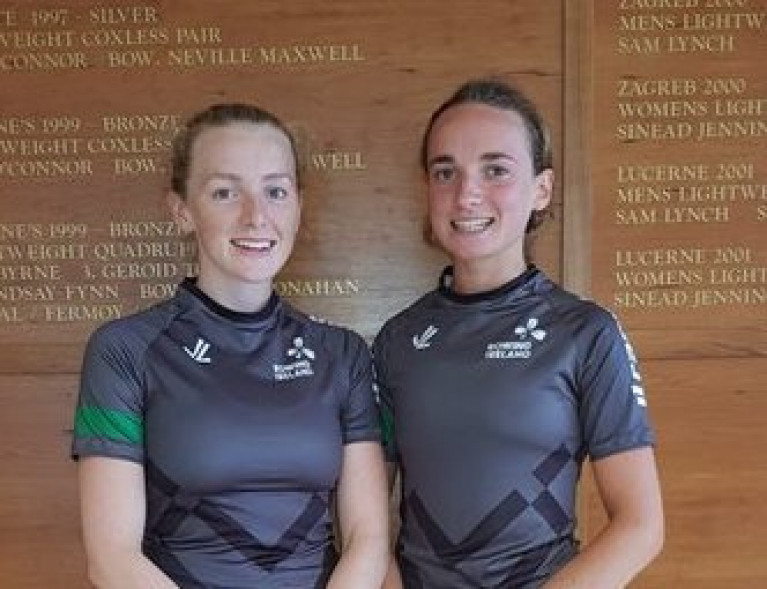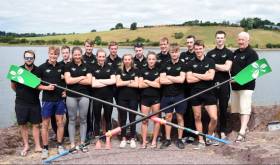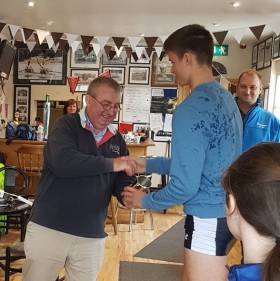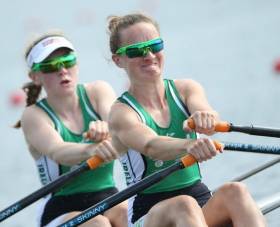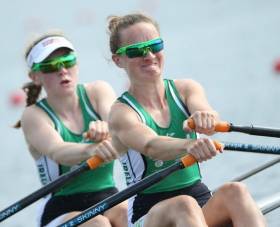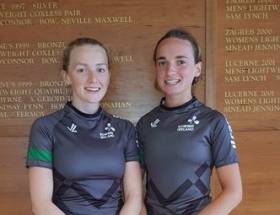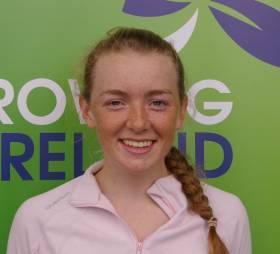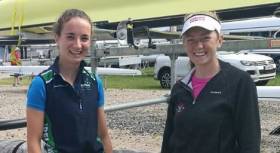Displaying items by tag: Cremen
Two superb performances by lightweight doubles got Ireland off to an excellent start on day two of the European Rowing Championships in Varese today.
The men’s crew of Paul O’Donovan and Fintan McCarthy would go on to have a great win in their semi-final, but Aoife Casey and Margaret Cremen deserve the plaudits for taking second in their semi-final.
This crew is aimed at the Olympic Qualification regatta next month in Lucerne and looked to be an outside bet initially. Their performances at this regatta changed that.
In today’s semi, they showed great maturity. Italy took over early and were never headed, while Russia and Ireland tracked them in second and third. But the final quarter Ireland pushed through into a firm second place.
Cremen and Casey take their place in the A Final on Sunday. The other semi-final, won by Britain from the Netherlands, looked stronger, but Ireland even have an outside chance of a medal.
McCarthy and O’Donovan were favourites for gold right from the start. Doubts, if there were some, related to the ability of the 2019 World Champions to turn it on again after effectively missing the 2020 season, such as it was.
They had a real test in Italy, who led early and might have expected another battle in the closing stages. It never happened. Coming up to halfway, McCarthy and O’Donovan zoomed past the men in blue. They opened up the lead to clearwater and won.
Germany, who won the other semi-final, will contend on Sunday. However, their winning time was slower than the Irish today.
The Ireland double of Philip Doyle and Ronan Byrne were well off the pace in their semi-final and finished sixth. France, Britain and Switzerland got off to good starts and duly took the A Final places. Ireland had a poor start. They tried to move into contention in the middle stages but could not get a hold on the contest.
Daire Lynch qualified for the C Final (places 13 to 18) of the men’s single sculls, taking second in his semi-final.
European Rowing Championships, Varese, Italy – Day Two (Irish interest)
Men
Double Sculls – A/B Semi-Final (First Three to A Final; rest to B Final): 1 France 6:10.26, 2 Britain 6:11.17, 3 Switzerland 6:12.79; 6 Ireland (P Doyle, R Byrne) 6:21.38.
Lightweight Double Sculls – A/B Semi-Final (First Three to A Final; rest to B Final): 1 Ireland (F McCarthy, P O’Donovan) 6:22.74, 2 Italy 6:25.53, 3 Czech Republic 6:27.14.
Single Sculls – C/D Semi-Final Two (First Three to C Final; rest to D Final): 2 Ireland (D Lynch) 7:02.22.
Women
Lightweight Double Sculls – A/B Semi-Final (First Three to A Final; rest to B Final): 1 Italy 7:11.44, 2 Ireland (A Casey, M Cremen) 7:14.44, 3 Russia 7:15.46.
#Rowing: The McCarthy twins, Jake and Fintan, gave Ireland its fourth A Finalist at the World Under-23 Rowing Championships in Poland today. They finished second in the semi-final of the lightweight double sculls. This was a close race: Spain led early on and eventually won from fast-finishing Ireland, who had won a battle with New Zealand, who took the third qualifying spot, and Portugal, who took fourth.
The early stages looked very promising for the women’s lightweight double of Lydia Heaphy and Margaret Cremen in their semi-final. They led to 700 metres, but then Greece and, with a more consistent challenge, Italy, moved ahead. The early part of the third quarter saw the Ireland crew fight a battle with Australia. The Australians moved into a clear third and from there Ireland slipped back. They finished fifth, behind the Netherlands, who took fourth.
World Under-23 Rowing Championships, Day Four, Poznan, Poland
Men
Lightweight Double Sculls – Semi-Finals (First Three to A Final; rest to B Final) 1 Spain 6:41.66, 2 Ireland (F McCarthy, J McCarthy) 6:42.45, 3 New Zealand 6:44.17.
Single Sculls – Semi-Final (First Three to A Final; rest to B Final): 1 United States (B Davison) 7: 14.65, 2 Ireland (R Byrne) 7:17.88, 3 Germany (M Weber) 7:24.24.
Lightweight Single Sculls – D Final (Places 19 to 24): 2 Ireland (H Sutton) 7:21.95.
Women
Lightweight Double Sculls – Semi-Finals (First Three to A Final; rest to B Final): 1 Italy 7:24.69, 2 Australia 7:30.08, 3 Greece 7:31.23; 5 Ireland (L Heaphy, M Cremen) 7:47.66.
Dorney and Cremen Top Rankings at Cork Sculling Ladder Trial
#Rowing: Jack Dorney of Shandon Boat Club was the fastest at the Cork Sculling Ladder time trial at the Marina. More than 170 single scullers participated on Sunday in the 46th running of the event, which is sponsored by Argos Fire and Safety Ltd and BioAugmentation Systems Ltd. Dorney won in a time of seven minutes and 7.2 seconds. Three other Shandon scullers filled the next three spots: Alex Byrne, Stephen O’Sullivan and Eoin Gaffney.
Margaret Cremen, who won last last year, was again the fastest woman – the Lee Rowing Club competitor finished 10th overall; Cork Boat Club’s Lisa Dilleen was the next fastest woman. Conditions on the river were calm.
The 2017-2018 Cork Sculling Ladder continues until April 1st.
Cork Sculling Ladder, Time Trial, October 8th. Selected Results:
- Jack Dorney, Shandon Boat Club. 7 min 07.2 sec
- Alex Byrne, Shandon Boat Club. 7:15.8
- Stephen O’Sullivan, Shandon Boat Club. 7:17.7
- Eoin Gaffney, Shandon Boat Club. 7:18.5
- Cian O’Sullivan, Cork Boat Club. 7:25.1
10. Margaret Cremen, Lee Rowing Club. 7:37.9
23. Lisa Dilleen, Cork Boat Club. 8:06.3 (8:07.6)
31. Aoife Lynch, Lee Rowing Club. 8:19.6
Cremen and Casey are Rowers of the Month
#Rowing: The Afloat Rowers of the Month for August are Margaret Cremen and Aoife Casey. The Ireland double finished seventh at the World Rowing Junior Championships. The Lee/Skibbereen duo reached the semi-finals in Trakai, Lithuania, but while they could not make the top six they were impressive winners of the B Final, where France tested them. Amongst the countries which did not reach the last 12 were Australia, New Zealand, the United States and China. Twenty-eight countries competed in this discipline.
Cremen and Casey had taken a silver medal at the European Junior Championships in Germany in May. It was another highlight of an exceptional season. Ireland underage crews have been part of the general rise: so far they have taken two medals at the World Under-23 Championships and five at the Coupe de la Jeunesse, a European junior tournament.
Rower of the Month awards: The judging panel is made up of Liam Gorman, rowing correspondent of The Irish Times, and David O'Brien, editor of Afloat magazine. Monthly awards for achievements during the year will appear on afloat.ie. Keep a monthly eye on progress and watch our 2017 champions list grow.
#Rowing: Ireland’s double of Margaret Cremen and Aoife Casey won their B Final this morning at the World Rowing Junior Championships in Trakai, Lithuania. The race developed very early into a battle between France and Ireland, with Ireland less than a boat length ahead for much of the 2,000 metres. In the sprint finish, France could not overtake the Irish women.
The result places Ireland seventh overall of the 28 crews which started.
World Junior Championships, Day Five, Irish interest
Women
Junior Double Sculls – B Final (Places 7 to 12): 1 Ireland (A Casey, M Cremen) 7:38.31, 2 France 7:39.65, 3 Netherlands 7:42.20, 4 Ukraine 7:42.25, 5 Japan 7:42.85, 6 Greece 7:44.73.
#Rowing: Ireland’s Aoife Casey and Margaret Cremen will compete in the B Final of the women’s double at the World Rowing Junior Championships in Trakai, Lithuania. In this morning’s semi-final, the Skibbereen/Lee crew took fourth, just under two seconds behind Chile, who took the third qualification spot. Britain were impressive winners, ahead of Italy. Ireland took over in fourth in the second half of the race, but while they finished fast, they could not force themselves in the trio which qualified for the A Final.
World Junior Championships, Day Four (Irish interest)
Women
Junior Double – Semi-Final Two (First Three to A Final; rest to B Final): 1 Britain 7:21.24, 2 Italy 7:25.05, 3 Chile 7:27.62; 4 Ireland (A Casey, M Cremen) 7:29.61, 5 France 7:30.71, 6 Netherlands 7:31.93.
#Rowing: Ireland have qualified for the semi-finals of the women’s double sculls at the World Rowing Junior Championships in Trakai, Lithuania. Aoife Casey and Margaret Cremen finished third in their quarter-final. Canada, who led from the early stages, won well. Ireland had tracked them, holding second from before halfway until the final stages when the Netherlands got ahead of them.
World Rowing Junior Championships, Trakai, Lithuania, Day Three (Irish interest)
Women
Double Sculls – Quarter-Final Three (First Three to A/B Semi-Finals; rest to C/D Semi-Finals): 1 Canada 7:23.78, 2 Netherlands 7:29.52, 3 Ireland (A Casey, M Cremen) 7:30.27; 4 Austria 7:33.56, 5 New Zealand 7:36.51, 6 Estonia 7:52.65.
Ireland's Casey and Cremen Progress at World Junior Rowing
#Rowing: Ireland’s Aoife Casey and Margaret Cremen took third in their heat and qualified for the quarter-finals of the World Junior Championships in Trakai in Lithuania today. The Skibbereen/Lee double had tucked into third behind Britain, who won, and Germany by halfway. Ukraine and Belarus fought to take the fourth qualification spot, with Ukraine coming out on top.
World Junior Championships, Trakai, Lithuania, Day One (Irish interest)
Women
Junior Double Sculls – Heat Two (First Four to Quarter-Finals; rest to Repechage): 1 Britain 7:08.82, 2 Germany 7:12.30, 3 Ireland (A Casey, M Cremen) 7:16.58, 4 Ukraine 7:18.06.
#Rowing: Barry O’Flynn of Cork Boat Club came from behind to win the junior single sculls title at the Irish Rowing Championships in Cork today. Jack Dorney of Shandon tested the favourite in an exciting race – and went ahead. O’Flynn came back and won by a length.
Two of the top junior women were involved in impressive wins. Hannah Scott teamed up with Katie Shirlow to win the intermediate pairs for Bann, while Margaret Cremen and Aoife Lynch won the junior doubles.
NUIG won two sucessive finals, the women’s club coxed four and the men’s intermediate coxed four, while UCC had started the first session of finals at the Championships with a win in the novice coxed quadruple.
Skibbereen called on the class of their international brigade to also win twice: Paul and Gary O’Donovan were untested in their senior doubles win, while Denise Walsh stroked the women’s senior four to a fine win over UCD.
Irish Rowing Championships, National Rowing Centre, Day One (Selected Results)
Men
Four – Inter, coxed: NUIG 6:13.38.
Sculling, Quadruple – Novice, coxed: UCC 6:39.37.
Double – Senior: Skibbereen 7:06.89.
Single – Junior: Cork (B O’Flynn) 7:04.06.
Women
Four – Senior: Skibbereen 6:40.58. Club, coxed: NUIG 7:10.92.
Pair – Inter: Bann 7:19.32.
Sculling, Double – Junior: Lee 7:09.86.
Silver Dream For Ireland at World Junior Championships
#Rowing: Ireland’s Aoife Casey and Margaret Cremen took a silver medal at the European Junior Rowing Championships today in Germany. The Skibbereen/Lee crew took second behind dominant crew Germany, and ahead of Italy, who took bronze. In a strong field, Denmark, the Czech Repbublic and Britain took the next three places. Ireland had the best last 500 metres, pushing up on Germany, but Italy came strong at the end to give the girls in green a small scare.
Casey, a daughter of Ireland coach Dominic, represented Ireland as a junior at the World Championships last year, while Cremen took a bronze medal at the Coupe de la Jeunesse in 2016.
Ireland’s three other crews placed in the top 10 to make it a very satisfactory campaign in Krefeld.
European Junior Championships, Krefeld, Germany (Selected Results; Irish interest, Day Two)
Men
Pair – Semi-Final B: 6 Ireland (A Johnston, R Corrigan) 7:17.95. B Final: 4 Johnston, Corrigan 7:20.57.
Sculling, Quadruple – Semi-Final B: 5 Ireland (J Quinlan, J Keating, M Dundon, B O’Flynn) 6:20.31. B Final: 4 Ireland 6:24.6
Women
Pair – Semi-Final A: 4 Ireland (G McGill, E O’Reilly) 7:51.31. B Final: 3 Ireland.
Sculling, Double – Semi-Final B: 2 Ireland (A Casey, M Cremen) 7:26.83. A Final: 1 Germany 7:21.64, 2 Ireland 7:25.84, 3 Italy 7:28.32; 4 Denmark 7:31.32, 5 Czech Republic 7:40.58, 6 Britain 7:44.31.



























